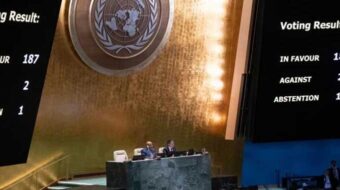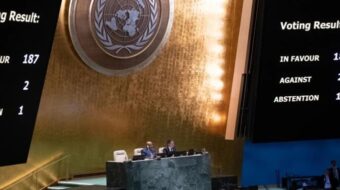
An earthquake killed 250,000 Haitians in January. A hurricane struck Nov. 5, shredding tarpaulins, shelter for 1.3 million homeless. Cholera arrived in mid-October, infecting 80,000 by Nov. 30, and killing almost 2,100. Experts predict that over six months, cholera will sicken half a million.
Cuban doctors led in responding to earthquake injuries. They’ve now cared for 40 percent of cholera victims. Over 900 doctors and other health workers are staffing 36 cholera treatment centers. UN spokesperson Niguel Fisher reports that Cubans are operating most of these CTCs throughout Haiti.
They’ve saved lives. Overall, 2.3 percent of 69,776 infected people have died, but of the 25,521 of infected persons attended by Cuban doctors, less than one percent died. As of Nov. 27, the Cuban teams had gone seven days without a cholera death. Argentinean physician Emiliano Marisca, trained in Cuba and working in Haiti, attributes success to trust Cuban doctors have earned by serving in Haiti for 12 years and by spreading out into remote areas to provide care.
Physicians associated with Doctors without Borders are in Cuba also. Joined by Haitian technicians and aides and staffing urban hospitals and 20 CTC’s, 150 of them had cared for 16,500 cholera patients by mid-November. Chief of mission Stefano Zannini expressed “concern that after five weeks, two actors were providing 80 percent of the medical attention,” meaning the Cubans and his own group.
UN humanitarian relief specialist Valerie Amos put out a call Nov. 24 for 350 more physicians and 2,000 nurses. Cuba announced that 300 members of the Henry Reeve medical brigade, disaster relief specialists, would go to Haiti to provide coverage for 12 additional CTCs. Their involvement will bring the total number of Cuban medical professionals combating the epidemic to 1,300, including dozens of Latin American School of Medicine graduates from 18 countries, Haitians among them. Several hundred additional Cuban doctors serve in Haiti on long-term assignments.
Norway, Venezuela and Brazil have supported the Cuban medical teams, contributing or paying for supplies.
The corporate media’s’ silence on the Cuban response annoys Angel Guerra Cabrera, writing in the Mexico City daily La Jornada: “I’ve lost count of the dozens of reports and interviews with … NGOs inside and outside Haiti in which Cuban collaboration forms no part of the story.”
Cholera aside, the Haitian people are living in the direst circumstances. Only two percent of earthquake rubble has been removed from Port au Prince. Most Haitians, jobless, lacking in formal education and prey to preventable deaths, endure extreme poverty. Hopes raised by President Jean-Bertrand Aristide’s decisive electoral victory in 2000 were dashed by his removal through a US-backed coup four years later. Since then, 9,000 United Nations soldiers and police have enforced a ban on Aristide’s Lavalas Party, in the process killing over 1,000 Aristide supporters.
Of $5.3 billion promised for earthquake reconstruction in March, rich nations have delivered only two percent. Washington is delinquent on its entire $1.15 billion commitment. As of mid November, donors had supplied only $5 million of $164 million requested by the UN for cholera relief.
They’ve been under the gun before: in 1915 – 1934, during U.S. military occupation; in 1957 – 1987, during the U.S.-backed Duvalier father-son dictatorship; and two centuries ago. Reacting then to slaves having achieved independent nationhood, Thomas Jefferson sought to “confine the plague to the island.” He set the stage for decades of commercial isolation.
Weeks before his death on Sept. 7, the Pastors for Peace leader Lucius Walker asked former Cuban President Fidel Castro about solutions for Haiti. Castro wrote, “Without losing a second, I told him, ‘In the present world there’s no solution, Lucius, in the future of which I speak, there is indeed.'”
LSAM graduate Dr. Emiliano Mariscal is of that future. “Each young person,” he observes, “besides being anti-imperialist, loves liberty, dreams of peace, [and] abhors … the death of little people, diverse people at the hands of well fed giants. Youth are reborn as ‘Our Americans.’ The future is in our hands. From action, comes collective welfare.” He calls for “undying struggle” and unity.
Image: British Red Cross // CC BY-NC 2.0

MOST POPULAR TODAY

Zionist organizations leading campaign to stop ceasefire resolutions in D.C. area


High Court essentially bans demonstrations, freedom of assembly in Deep South

Afghanistan’s socialist years: The promising future killed off by U.S. imperialism

Communist Karol Cariola elected president of Chile’s legislature






Comments